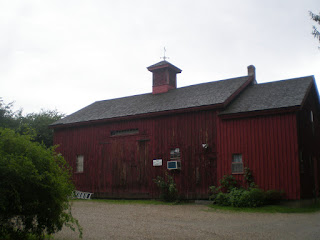As some of you know, I was in Atlanta last weekend for the
South Atlantic Modern Language Association's (SAMLA) conference. I was part of the panel sponsored by the
Hawthorne Society, and presented a paper on the pedagogical rewards of teaching
Uncle Tom's Cabin and
The Scarlett Letter. I won't say too much more about that (unless you actually
want to hear more), but I think it went very well. The other papers on the panel were quite interesting, and there was some great discussion afterwards.
The not-so-well kept-secret about conferences, though, is that as much as they are about scholarship and professional development, they are also about having at least some fun. I try to apply to conferences in interesting places and I always try to talk my friends into applying, too. This year I was successful in getting my friend David (from UNCG) to apply and (naturally) his paper was accepted, too. I flew down from WV (actually out of Dulles Airport) and he drove down from Greensboro, bringing our friend (Liz) Vogel with him.
Now you know I
wanted to take lots of cool pictures for the blog, right? And I got off to a good start. Here, for instance, are a few from our balcony of our hotel room (we stayed at the
Renaissance Atlanta Hotel, where all the conference events took place):

The road you see there is I-85. Gotta love that tacky Olympic torch.

Off to the left of the interstate and the tacky torch, you can see the Georgia Tech campus and football stadium (I think).

And here's the view to the right--lots of big buildings. Yup, that's all I can say about them.
So, you can see that I got off to a good start with my picture-taking, right? But then life (and the conference) intervened. We ended up having to spend most of Saturday inside doing conference stuff (and no, I am not really complaining about this--that's what we were there for, after all). We did go out on Saturday night, but I still haven't mastered using my camera in the dark. (Remember those
lighthouse pictures from my trip to Cape Cod?)
I did, however, get some good pictures of my friends while we were doing what tourist do best: eating.

Here are Vogel and David at dinner on Saturday night. We ate at this very cool Chinese restaurant called
Mu Lan. It was in this beautiful old Victorian house on Juniper street. My favorite dish? The honey-walnut chicken. Yummy.
Another restaurant we enjoyed was
Mick's. We had dinner there on Friday night since we were looking for something on the affordable side. (Remember--some of my friends are still poor graduate students. I know--as if I am rolling in money.) We went back to Mick's for dessert on Saturday night and, perhaps inspired by Amber's
food photography, I took some pictures.

My dessert: apple pie ala mode. Yummy. Side story: I was actually in the bathroom when the food arrived, and by the time I returned, the other folks had already tried it and assured me it was "delicious." Can you tell we are a close group?

David ordered this bigger-than-your-head Heath bar pie, and it too, was delicious. Seriously. Take a look at that thing: how can it
not be delicious?

Vogel ordered strawberry shortcake, but the waitress dropped it on her way over to the table. By the the time she brought a new one, I forgot to take a picture. You'll just have to settle for this picture of her waiting patiently for her dessert, which was also delicious.

Sugar makes David silly, as evidenced by this picture he took of himself. I post it here only to be mean. I'm like that.
Speaking of restaurants, if you are ever in Atlanta, let me give you another restaurant recommendation:
Gladys and Ron's Chicken and Waffles, (owned by Gladys Knight and Ron Winans). We went there for lunch on Saturday and oh my Lord, that was some good food! We meant to go back and take pictures, but didn't get the chance. We also wanted to go back and order the "Midnight Train," four chicken wings and a waffle. Well, maybe next time.
Okay--a couple more pictures:

Vogel and David posing in a English-style phone booth outside a bar.

Me on Saturday night. Not an awful picture, right?






















